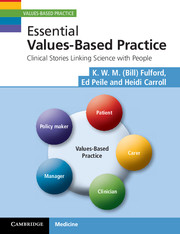Book contents
- Frontmatter
- Review quotes
- Contents
- Foreword
- Acknowledgements
- A bold claim to start this book
- Prologue: linking science with people
- Part 1 Values, individuals and an overview of values-based practice
- 1 “It's my back, Doctor!” (episode 1): values and clinical decision-making
- 2 “It's my back, Doctor!” (episode 2): applying the tools already in the clinical toolbox for working with values to individuals
- 3 An outline of values-based practice: its point, premise and ten-part process
- Part 2 The clinical skills for values-based practice
- Part 3 Relationships in values-based practice
- Part 4 Science and values-based practice
- Part 5 Bringing it all together
- Postcript: the small change of care
- A bold claim to end this book
- Appendix A Values-based practice summary and definitions of key terms
- Appendix B Values-based practice teaching framework
- Index
3 - An outline of values-based practice: its point, premise and ten-part process
Published online by Cambridge University Press: 05 June 2012
- Frontmatter
- Review quotes
- Contents
- Foreword
- Acknowledgements
- A bold claim to start this book
- Prologue: linking science with people
- Part 1 Values, individuals and an overview of values-based practice
- 1 “It's my back, Doctor!” (episode 1): values and clinical decision-making
- 2 “It's my back, Doctor!” (episode 2): applying the tools already in the clinical toolbox for working with values to individuals
- 3 An outline of values-based practice: its point, premise and ten-part process
- Part 2 The clinical skills for values-based practice
- Part 3 Relationships in values-based practice
- Part 4 Science and values-based practice
- Part 5 Bringing it all together
- Postcript: the small change of care
- A bold claim to end this book
- Appendix A Values-based practice summary and definitions of key terms
- Appendix B Values-based practice teaching framework
- Index
Summary
Topics covered in this chapter
This chapter gives an initial overview of values-based practice by way of preparation for the case studies that follow in the rest of the book. We cover:
The point of values-based practice: balanced decision-making within a framework of shared values
The premise of values-based practice: mutual respect for differences of values
Ten elements of the process of values-based practice:
º Four areas of clinical skills
º Two aspects of professional relationships
º Three links with evidence-based practice
º Dissensus: a basis in partnership.
Take-away message for practice
Values-based practice is a process that supports balanced decision-making within a framework of shared values where complex and conflicting values are in play.
In this chapter, we give an outline of values-based practice by way of preparation for the detailed case studies that follow in the rest of the book. We will be drawing in this instance not on a specific clinical scenario but rather on a number of brief examples, mainly from mental health and primary care.
Values-based practice aims to support balanced decision-making within a framework of shared values, based on a premise of mutual respect and relying for its practical effectiveness on good process rather than pre-set right outcomes. We start with the point of values-based practice by looking in more detail at what balanced decision-making within a framework of shared values really means.
The point of values-based practice – balanced decision-making
The need for balanced decision-making on individual cases where complex and conflicting values are involved became clear as we followed the story of Dr. Gulati and Roy Walker in the last two chapters.
- Type
- Chapter
- Information
- Essential Values-Based PracticeClinical Stories Linking Science with People, pp. 24 - 36Publisher: Cambridge University PressPrint publication year: 2012



